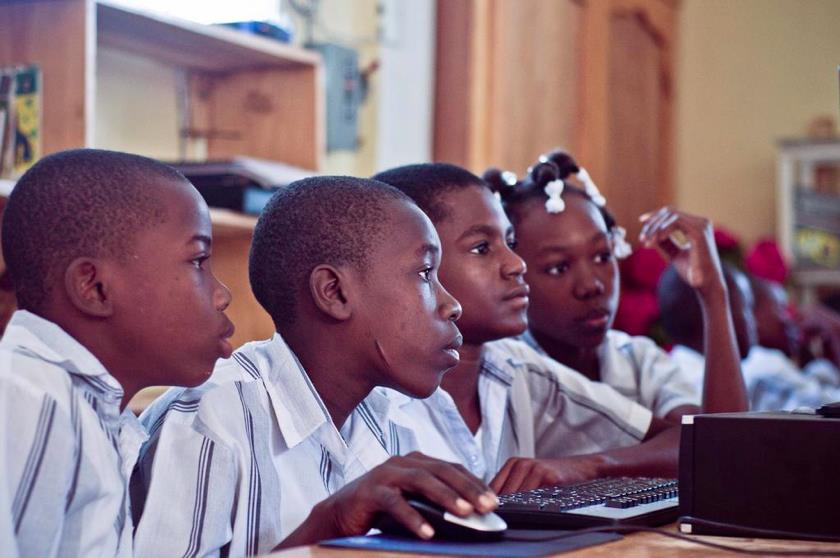by Augustinus van der Krogt*
In 2013, I was hired to collaborate with the Haitian Ministry of Education on its Information and Communication Technology (ICT) strategy and implementation plan. Its purpose was to contribute to expanding access to primary education and improving its quality. Interestingly –very different from many other countries that I have advised – it resulted in a promising strategy that puts education first and builds on already ongoing experiences in the country.
The IDB supports the strategy development in a facilitatory and advisory role. To advance the strategy, in 2013, I facilitated a round table discussion to debate the main opportunities and challenges of the education sector in Haiti, from which “limited access” and “education quality” emerged as key challenges. Limited access is explained by high education costs and extreme poverty levels, making it difficult for many parents to send their children to school. The low quality of education is partly due to the low percentage of qualified teachers, lack of teaching materials, and outdated teaching methods. Thus, Haiti has not yet achieved universal access to primary education, many children drop out of school, and those who ultimately graduate often fail to reach basic levels in reading, writing, and mathematics.
To enhance access to education and improve its quality, Haiti chose to develop an ICT strategy and an implementation plan that is based on the following three pillars:
 1) Paving the way towards active learning. First, the strategy will use ICT to refine teaching and learning methods. ICT allows children to participate in lessons and problem-solving activities, thus making them the center of an active learning process. Teacher training programs supported by the IDB, the French Government, and International Rescue Committee (IRC) provide good examples of how ICT can be used to achieve this active learning. These programs experiment with videos of real life classroom situations created by teachers to help their colleagues and share best practices about active learning methods. In search of a simple and low-cost solution; IRC has further explored the idea of storing videos on a Smartphone and projecting these to broader audiences with tiny pico-projectors.
1) Paving the way towards active learning. First, the strategy will use ICT to refine teaching and learning methods. ICT allows children to participate in lessons and problem-solving activities, thus making them the center of an active learning process. Teacher training programs supported by the IDB, the French Government, and International Rescue Committee (IRC) provide good examples of how ICT can be used to achieve this active learning. These programs experiment with videos of real life classroom situations created by teachers to help their colleagues and share best practices about active learning methods. In search of a simple and low-cost solution; IRC has further explored the idea of storing videos on a Smartphone and projecting these to broader audiences with tiny pico-projectors.
2) Developing relevant content. Secondly, the strategy aims to develop interactive education content that teachers can use as part of the active learning process in their classrooms. Numerous quality open source education resources exist, such as Sankore.org, which provide interactive digital content for most subjects. Yet, to ensure that content is adapted to the Haitian context, the Ministry and several partner organizations began to develop interactive learning materials both in French and Creole grounded in local realities.
3) ICT in the classroom as the finishing touch. Finally, the strategy will build on successful local initiatives to bring ICT into the classroom. Among them, the strategy will seek to expand the Ministry’s interactive educational radio with IDB support. This initiative will be implemented at first in 100 schools starting in 2014. Students and teachers will be able to listen to lessons using solar-powered radios, which play the educational content from USB drives. This will be an effective solution for 80% of schools in Haiti that do not have access to electricity.
 In schools where access to electricity is not an issue, the strategy will build on the successful experience of the French government and the non-Governmental Organization (NGO) Haiti Futur, who have used “interactive white boards” to project math or science contents on classroom walls. This enables students to actively participate in problem-solving activities in school.
In schools where access to electricity is not an issue, the strategy will build on the successful experience of the French government and the non-Governmental Organization (NGO) Haiti Futur, who have used “interactive white boards” to project math or science contents on classroom walls. This enables students to actively participate in problem-solving activities in school.
Finally, the NGO Inveneo has successfully set up small computer labs in a select number of schools to enhance basic ICT skills of teachers and pupils, and will complement the experience by using digital content and tablets in the classroom to improve teaching and learning.
Having finalized the strategy, the IDB now collaborates with the Ministry to formulate a large-scale implementation plan that integrates and builds on the most promising ICT initiatives. We hope some of these innovations can leapfrog primary education in Haiti into the 21st century. The vision, ideas, and tools are there! The IDB is committed to helping Haiti in the implementation: Ayiti en pil!
*Augustinus van der Krogt, Ph.D., is a consultant for the Inter-American Development Bank’s Education Program in Haiti.



Leave a Reply